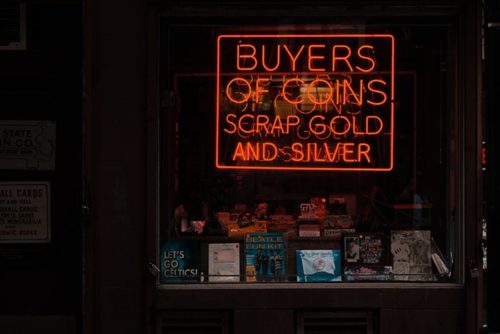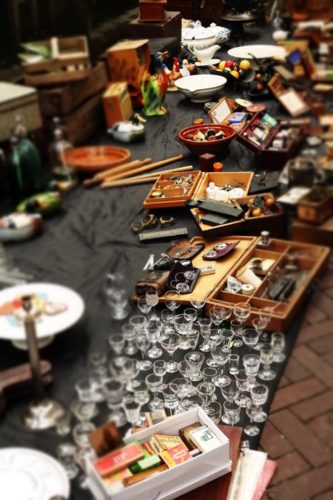Psst, do you want to hear a secret? (I’m assuming you answered yes, because who says no to that?) Alright, this is a little hard for me to say, but… I have too much stuff. I know it’s hardly the salacious secret that keeps tabloids in business, but it’s still something I feel uncomfortable saying out loud.
It’s probably that throughout my formative years, advertisers bombarded me with the message that more stuff makes people happy: more toys, more clothes, more expensive gadgets to entertain myself. Basically, Western culture sells you this myth that buying things will bring you happiness. If you run out of space in your closet, you can always pack your seasonal items in boxes in the attic. Out of room in your DVD stand? You can always buy another. If you run out of room in your house, you can always pay a company a monthly fee to store the skis you’ve used twice and the furniture you inherited from Grandma that doesn’t suit your style right now, but maybe one day.

Ending the Cycle
Over the past three years, I have begun to reject this notion. I think it’s probably that I now work from home, which means I’m surrounded by my stuff all day long, so I feel a little suffocated by it. It’s also probably that I’m no longer in the city center, so I don’t waste my lunch break buying fast fashion. I don’t think I’m the only person who feels like that.
Whether you’ve been inspired by Marie Kondo’s Netflix special “Tidying Up,” you’re getting a jump start on spring cleaning, or you’re just fed up with never being able to find the item you actually want in your overflowing dresser, there is no better time to start decluttering. And no better time to start making money from it.
Yes, that’s right. It’s time to trade in your unwanted items for cold, hard cash. Money that could be used to pay something off your mortgage, let you take a weekend break or be put towards your children’s college funds.

Benefits of Decluttering
Making extra cash
Decluttering can also be a real money maker, which is probably what led you to this post in the first place. Your trash is someone else’s treasure, and they might be willing to pay big bucks for it. While you probably can’t afford to retire selling unwanted items that are currently hidden away under your bed, you could make enough money to take a couple of days off work and treat yourself.
Saving the environment
When we buy new, manufacturers have to use more natural resources to create our products. If we hoard perfectly usable items that we just don’t need any more (or worse, drop them off the dump), it means that someone else will go out and buy it new. This is unsustainable.
Improving mental health
Decluttering can boost your confidence, self-efficacy, energy levels, and creativity, while reducing anxiety and stress. This is because you’re forced into a productive mode and the endorphins you get from that will encourage you to continue marking items off your to-do list. It also means that you can find what you need more easily, which means rushing everywhere because you couldn’t find something that you needed (i.e., car keys).
So, let’s not beat around the bush anymore. You have items you want to get rid of, and you want to know the best way to do it.
Decluttr vs Amazon
Decluttr
Decluttr is an easy, fast, and free way to sell your items online. All you have to do is enter the name of the tech product (i.e., iPhone 7) or the barcode of media items (i.e., CDs or books), answer a couple of questions, and they’ll give you an instant price. (They even have a free mobile app to streamline the process by allowing you to scan the barcodes with your phone’s camera.)
If you like the price, then they’ll send you a free shipping label, and you just drop the box of items off at your nearest UPS store. The day after Decluttr receives your items, they’ll make the payment. It couldn’t be simpler.
What does Decluttr take?

- Cell Phones
- CDs
- DVDs
- Blu-rays
- Video Games
- Books
- Smartphones
- Tablets and Kindles
- Wearable Tech
- Consoles
- Apple Products (i.e., iPods, iPads, and Macbooks)
- LEGO (bought loose by weight)
Pros
Simple: Nothing could be easier than typing or scanning in your item, accepting an offer, and posting it off. You don’t have to write a description or take photos. You don’t have to worry about buyers changing their minds. And you don’t have to worry about sorting out shipping labels.
Fast: If you need to get rid of your stuff quickly, perhaps ahead of a move, Decluttr is the ideal choice. You can sell and post everything in just one day. You'll probably even get paid in less than a week.
Free: Most online marketplaces will charge you a fee to list your items and an additional fee when your item sells. You’ll also have to pay for shipping unless you charge the buyer for it. This can add up, especially if your products aren’t selling for that much.
Best price for electronics: Decluttr claims proudly to give the best prices for electronics and, based on a small study I did of items in and around my home office, they did. In fact, on my 32GB iPhone 5, Decluttr offered more than double its nearest competitor.
Cons

Less money for media items: Decluttr is buying your products to sell onto other customers or to recycle its components. This means that to make a profit, they buy your unwanted items at less than they are worth. While some users report offers of $5 per media item, you’re more likely to make $0.50-1. So, you might make more money selling them directly on an online marketplace, even with the fees. Also, if there’s any kind of damage the items, Decluttr won’t pay you, and they won’t send the items back.
Less product variety: Decluttr has a set list of stuff it will and won’t buy, so if you want to sell off some old clothes or a stuffed toy, you’ll have to find somewhere else.
Doesn’t buy older tech: Another problem is that Decluttr considers some tech or media too out of date to be worth anything. A quick search for the original iPhone yielded no results, but I sold mine last year on an online marketplace for $35. (It might have been the nostalgia factor, rather than anyone wanting to use it as a phone.)
Amazon Trade-In Program
The Amazon Trade-In Program is a simple way for you to trade in your unwanted items. All you have to do is look up the item that you want to trade in, click the trade in button, and you’ll get an immediate price.
You then ship the items to Amazon using their pre-paid shipping label and get paid soon after your items arrive. They also have a free iOS and Android app that you can use to scan your items in.
What does Amazon Trade-In take?
- Books
- Cell Phones
- Video Games
- Tablets and Kindles
- Bluetooth Speakers
- Amazon Echo
- Streaming Media Players
- Video game console
- Video game accessory

Pros
Free: There are no fees or hidden charges to the Trade-In Program. Amazon will even issue you a free tracked shipping label for your items. All you have to do is find a box. (Pro Tip: Supermarkets will give you free boxes if you ask nicely.)
Simple: As with Decluttr, you’ll never have to deal with difficult buyers asking questions that they could easily Google, like “Does this console work in Britain?” or “Does Region 2 play in Australia?” You also don’t have to mess around with creating a listing or actively trying to sell the item.
No cost for returned items: If your item is damaged or can’t be accepted for any reason, then Amazon will return it free of charge. This is great news for those of you worried about losing the item and not getting paid for it.
Instant payment: Some customers will be eligible for instant payment when submitting certain items, but, obviously, if the Trade-In is canceled or the items are not accepted, then Amazon will charge your account for the amount they placed on your gift card.
Cons
Items must be in good condition: Unlike other sites that will take broken or damaged items to recycle for spares, Amazon requires the products to be in the same condition that they are listed as in the Trade-In Store.
Paid in Amazon gift cards rather than cash: If you’re saving money to buy a big ticket Amazon item (i.e., a Kindle Fire), you use Amazon a lot for shopping, or it’s your go-to for gift shopping, then this could work out well for you. After all, there’s no chance that you’ll spend the money on something else. However, if you’re looking to spend the extra money on a holiday or save for a down payment on a house, then you'll be miffed that you can only spend it on the site.
Fewer types of items accepted: Amazon doesn’t accept as many types of items as some other sites, so you can’t sell DVDs or CDs to them anymore, but they do advise checking back regularly, as they are constantly updating the catalog. However, as with Decluttr, they are unlikely to accept non-media related items.
Which One Should You Choose?

This is the really important question that has been on your lips since you clicked onto this article comparing Decluttr vs Amazon, but in all honesty, it depends on what you have to sell, what you want the money for, and what price you want to sell it for.
For example, if you have a lot of DVDs and CDs to sell or you want to be paid in cash, you’ll need to choose Decluttr. However, if you’re looking to spend the money on an Amazon product, then choose the Amazon Trade-In Program if they offer a better price. It really is dependent on your circumstances.
However, it never hurts to mix and match. List your item through both apps to see who is offering you the best price for it and then choose the highest bidder.
If Amazon is offering only slightly more on a book, then weigh up whether you should get the lower price in cash just to increase the amount of money in your pocket. However, if Amazon does happen to offer you a higher price for your tech items, you can always show that to Decluttr and ask them to match it because they do advertise the best price for tech items. It’s a win-win-win situation.
Getting Rid of Stuff That Hasn’t Sold
There is a chance that you might not be able to sell all your unwanted items via either Decluttr or Amazon. It could be that your product falls outside the categories that they buy or is not in the condition that they require. But don’t throw it away just yet, there are still plenty of ways to make money from your goods.
Depending on the item, you might be able to sell them directly to customers via an online marketplace or to local shops for store credit or even to a pawnbroker.
Pawn Shop

These type of shops can have a bad reputation, but they can allow you to get rid of electronics, jewelry, antiques, or any number of things depending on what they specialize in. This means that you can get rid of a lot of diverse items in one go.
Pros
- Easy
- Can buy back items if you change your mind
- Quick
Cons
- Lower money than you could get elsewhere
eBay
This is most people’s go-to site for selling stuff online. Here you can sell anything from old CDs and DVDs to a brand new car and everything in between. You’ll have to do a bit of work to create a listing, including taking good photos, making a note of any damage, and working out how much it will cost to ship, but this can often result in getting more cash than for a basic listing.
Pros
- Sell almost anything
- Free listings are available
- Can make more money selling this way
Cons
- Fees
- Dealing with problem buyers
- Can take ages for your item to sell
- Shipping can be tricky to arrange
Yard Sale

I think everyone knows how a yard sale works. You put out a table, set out your items to sell, and spend a Saturday on your front lawn. It's often best to do this as a neighborhood effort to get more people interested and get more potential customers milling about
Pros
- Free
- Sell almost anything
- Payment in cash and upfront
Cons
- Hagglers
- Need to get publicity
Facebook Marketplace
This is sort of like eBay, but there are no fees. You take a picture, write a description, name your price, and wait for buyers to come to you.
Pros
- Free
- Sell almost anything
Cons
- Problems getting payment (Top tip: stick with PayPal or a similar service)
- Shipping can be tricky
- Can take ages to sell
What if You Can’t Sell Your Items There Either?

If you’ve tried all of the methods above and you still can’t shift your goods, then you might not be able to get any money for them, but that doesn’t mean that you have to ditch them. Why not try donating the items to charity for a tax write off? This is a fantastic opportunity for you to clear out, do good, and get some tax relief for it.
If you have old, but still good condition, clothing, electronic, or homeware items, seek out your local shelter for domestic abuse victims, homeless people, or refugees. They can make the world of difference for someone starting a new life.
If you have bedding or towels that have seen better days, you can donate them to the local animal shelter for the rescue animals to use as bedding. It also great to donate any toys, clothes, or treats that your pet doesn’t like.
Or you can always drop any unwanted items off at your local Goodwill, where they’ be sold for charity.
What if your items aren’t decent enough to donate?

If the item is too worn or damaged to be usable by the average person, you can always drop it off at your local recycling center. Many places will recycle electrical goods for free, but some will even take damaged clothing and the like to strip down into fabric that can be reused.
Now that you’ve done all the hard work to get rid of your unwanted items, try to save the money to pay off bills (i.e., student loan or mortgages) or towards experiences (i.e. holiday or days out), rather than putting it back into stuff that might not have long-term benefits for you.
In the long run, it's better to buy slightly more expensive and better quality items, rather than having to replace your leggings every other month, and timeless items that won’t get thrown out next season. It’s better for the planet and your wallet.



